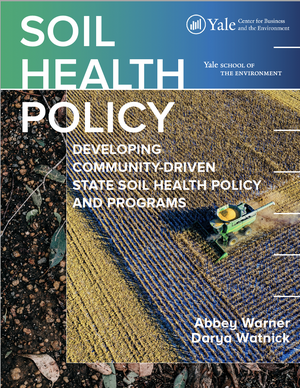New Guidebook Supports Healthy Soil Policy-making

Two Yale Master of Environmental Management students recently authored Soil Health Policy: Developing Community-Driven State Soil Health Policy and Programs as the newest fruit of The Yale Center for Business and the Environment’s Regenerative Agriculture Initiative.
Abbey Warner and Darya Watnick worked with dozens of practitioners and other experts in farming, climate adaptation, policymaking, sustainable investment, coalition-building, and related fields to provide practical advice for people interested in developing community-driven, state-level soil health policy and programs.
Soil Health Policy steers potential community leaders from concept to ongoing commitment. It reports on and distills practical tips for captivating policymakers’ attention, celebrating wins of all sizes, and sustaining collegiality across groups whose interests sometimes crisscross. After sharing this advice, the guidebook maps what a coalition should ask for in a piece of legislation and how stakeholders can ensure that a policy does what it should. Readers will find counsel on outreach, drafting, writing, implementation and monitoring for soil-relevant outcomes.
Why focus on the steps of building coalitions, planning meetings and wording outreach email? For the authors, that question answers itself. Communities that understand soil health’s wide and recurring benefits will fund, educate and advocate around a suite of policies that make soil thrive. Conversely, in communities where division cracks potential alliances, soil and the overall ecosystem degrade. At all levels of government, a healthy process precedes healthy soil - and social organizations in which many leaders know how to manage and sustain trust can keep that soil healthy.
Moreover, the guidebook’s focus on advocacy at the state level makes it practical amid whatever political winds blow across national and international negotiating tables. Soil Health Policy squares its attention on the work that people do as neighbors. In an ideal context, that frame recurs at broader levels as decision-makers take up questions about sustaining viable societies amid drought, wildfire, climate migration and persistent inequality. Leaders in communities can’t wait for ideal conditions, though, so the guidebook articulates how to change conditions where readers live. The lessons, and the conversational voice that carries them, can buoy readers through multi-hour meetings and multi-message email threads for people building coalitions to enhance community well-being.
The Regenerative Agriculture Initiative, one of CBEY’s ongoing collaborative projects, includes a series of articles outlining best practices in the specialty and an evolving set of case studies, special projects and proposals, and research.
For a copy of Soil Health Policy from CBEY's Regenerative Agriculture Initiative, click here.
For more information, contact Heather Fitzgerald at heather.fitzgerald@yale.edu.
